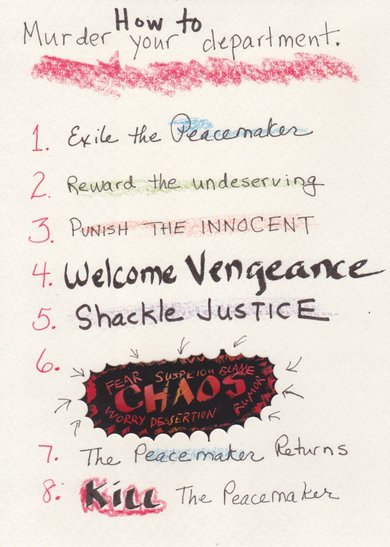|
He'd planned to write all morning, but had ended up in the emergency room instead. As he watched the pain meds drip through the IV, he reflected on the wisdom of reaching for the page the wind blew off his desk. It wasn't that great, anyway.
0 Comments
Every day, a story. The month was almost over and it couldn't end too soon. At first, it had been fun; she'd wake up and check her email for the prompt, then think about it while she took a long shower. Day six was promising; a choice bit of flash fiction with a twist she was particularly proud of. But that was followed by several days of progressively weaker and more disappointing efforts. At the two week mark, the muse woke up again and graced her with an inspired plot. She rushed through her shower and threw on a pair of jeans and an old t-shirt, fired up the computer and -- vanished. The words wouldn't come, and the brilliant plot transformed into a moldy skeleton.
For the next week and a half, ideas came hard and words came harder. Stiff. Trite. Repetitive. Really, really repetitive. On the last day, the morning routine came up empty. She showered until she was wrinkly. A long walk did nothing. The skies closed in and soon she was staring out the window at a gray, drizzly afternoon. Time for a nap. And in that nap, she found the most amazing story. I started off with today's prompt, which was to tell a story as a series of letters, or tweets, or similar installments, all in the first person. But I ended up using my tarot deck again. I drew three cards for the beginning, middle and end of the story. And here it is. I almost did it the summer I turned twenty-one.
It started off as a routine Friday night at the buffet-style restaurant where I worked. The food was nothing special, but it would fill you up without emptying your wallet. The big attraction was the improv show, featuring a manic group of theater majors from area colleges. I remember a few of them by name, the ones I thought might make it big someday. But It's a sure thing none of them remember me -- the waitress uniform and hairnets probably made a bigger impression than I did. But there was that one moment when I almost came out from behind the dessert table and became -- a star. The adorable blonde guy had asked the audience for prompts for the next sketch, and someone yelled "a waitress"! His eyes scanned the room and caught me -- "You!! Come on!" In a flash, I imagined myself whipping off my hairnet and letting my long hair cascade down my back, unbuttoning the top two or three buttons of my polyester uniform, and wowing them with my version of "Let me entertain you" (The one I had been practicing in the shower since I was ten.) But then the old me took over. I shook my head, stepped back, and stammered, "I-I-I can't". But I almost did. The prompt today was a delightful challenge, for a change: a prose "sonnet" -- a story in fourteen sentences, grouped in some way. I chose the Shakespearian arrangement, 4-4-4-2. The first grouping is from Genesis, as it appears in the King James version. It is more than 4 sentences, but I don't care. Abel and Cain
8 And Cain talked with Abel his brother: and it came to pass, when they were in the field, that Cain rose up against Abel his brother, and slew him. 9 And the Lord said unto Cain, Where is Abel thy brother? And he said, I know not: Am I my brother's keeper? 10 And he said, What hast thou done? the voice of thy brother's blood crieth unto me from the ground. What were they doing in that field, I wonder? “Cain talked with Abel”, but did Abel talk back? Or did he glower at him, his face dark with anger? Perhaps Abel laughed scornfully, shook his head, and turned his back. Imagine instead that Abel put his hand on Cain’s shoulder. That he said “Please, don’t say that, brother”. That he said “I would never do that to you”. That Cain saw the truth and was sorry. God would be so relieved. Instead of endless parables about fratricide, he could create cicadas with wings like butterfies. I used to work in a different department on the same campus. We were tops; more research grants, more PhD students, more publications than any other unit in our college. We attended graduation together, watched the Super Bowl together, and, when threatened by outsiders, defended ourselves and each other with loyalty and absolute sincerity. But in a period of about five years, we went from a powerhouse department to a scattered band of former colleagues. For years, I have joked that when I retired I would write the story of how it happened, but it would have to be disguised as a murder mystery. Today's prompt was to turn all or part of a story into a list. So here is mine: Don't worry; it's not entirely true, and if you think you are on the list, you aren't.
For the faint of heart, a word of reassurance: Academic murder isn't real murder. And a caution for everyone: this works for killing other social groups, too. Today's prompt was a personal challenge. Write a story (set in your novel’s world) that makes sensation a priority. Use all five senses. I am not generally good at descriptions, especially of sensations. When I took a storytelling class last year, the leader gave us a similar prompt, and I remember about the experience was how I struggled with it. Anyway, here goes nothing. Anna woke up to a stuffy nose, dry mouth and sharp pain in her throat. It hurt to swallow; what if she lost her voice? Luckily, she’d brought a supply of her favorite licorice-flavored herbal tea with her. Tilting back in the creaky recliner, she sipped the scalding tea and was about to consider alternate plans when she heard an unmistakable sound. First faint, then louder, then filling the room: the slightly discordant, full-throated cry of a steam whistle. Engine 844 was making its way into North Platte!
Half-running the three blocks to Front Street the hot tea occasionally scalding her hand, Anna joined the swarm of North Platters converging on Front Street to look and listen and take pictures. In spite of the pre-dawn chill, it was the biggest crowd she had seen anywhere the entire week! There were scores of children, many riding the shoulders or father and grandfathers who regaled them with personal stories. “Grandpop used to work on those!” “I built engines just like that!” “When I was little, I saw these everyday from my backyard!” The great black engine was on a siding just beyond chain link fence, now and then exhaling a hissing cloud, or even a shriek of steam, to the delight of the children. It was scheduled to depart at 8:30, but the hour came and went with no sign of movement. The retired railroaders in the crowd offered various explanations and argued genially about the likely reason for the delay. Anna eavesdropped and sipped her tea, which had grown cold but was still somewhat soothing. Her head was clearing, and she could even breathe through her nose again. She sniffed the cold morning air, and then inhaled deeply the mingled smells of steam, oil, alfalfa from the surround fields, and bacon wafting from the diner next to the tracks. The sun came up and still the engine sat. The crowd thinned, as work and school beckoned. Anna was about to head back to the motel, when a chuffing sound and a piercing whistle announced that Number 844 was about to move on. Slowly, it backed along the siding, almost out of sight beyond the Poplar Street viaduct. Then, another whistle, and another, and the thunder of her steam-powered driving wheels, each taller than most men, and the mighty machine headed toward Cheyenne and was gone. Anna sighed and glanced around. Across each face was a broad grin. Today's prompt: Write a story focusing on an aspect of society that matters to you/your story. This phone call was getting awkard.
"I feel kind of weird just leaving her alone. Though Peg will be here, as usual. But people expect..."John paused. Carl laughed. "Since when do you care about what people in North Platte expect? Oh, that's right. Since puberty. Nice cushy closet you've built for yourself, buddy. No one would suspect --" "That's enough. You wouldn't know what that's like. North Platte isn't Denver." "No, and Denver isn't Sunderland", Carl replied, gently. He'd come out to selected friends in high school, to his brother and sister in college, and to his parents a few years later. Being gay in a small, conservative town required a delicate touch, and a willingness to take risks. "And I am not you", John said firmly. "Just as well", he heard Carl say, and he could imagine his smile. "So here's a thought: why don't I come there?" John hesitated, and Carl added, "We've done it before. Your old college buddy, Carl. No holding hands, just two old straight dudes watching the Huskers over wings and beer." "Well..." "And I could help out. She's bound to need some physical therapy after being immobile for so long. Let's at least try. And I miss you." John relaxed and nodded, cradling the phone in both hands. "I miss you, too. Come on, as soon as you can get away. We'll just have to be careful around her." Carl chucked. "Sure. But who knows what she's overheard the other times I've been there? People in comas aren't completely unconscious --" "Jesus, Carl! Don't remind me!" "See you on Friday." This part takes place later; I have not written the stuff in between. Anna peered at them and shook her head. They had the buddy routine down to a science, but she wasn't fooled. Would she just come out and say it, or have some fun. Have some fun it was. "You married, Carl?" "Nope. Carefree bachelor, just like John". "Well, John's a special case, isn't he? He's got me, all these years. I'm a lucky girl." Carl fidgeted a bit, but quickly reverted to his cheery self. John looked away, nervously. "Yep", Anna continued, "I'm truly blessed. A veritable Sleeping Beauty, opening her eyes to see her old Prince Charming waiting faithfully for her. So blessed." She gave John her best goo-goo eyes, enjoying his obvious discomfort. "And now it appears the whole town is waiting for the engagement announcement. Right, John?" John wet his lips and opened his mouth, but nothing came out. Today's prompt: Write a story that focuses on the discovery/invention/ramifications of something that shapes your characters’ physical world. Lying in the dark, Mary conjured up a memory of her Willow Street bedroom. It had been bigger than this room, or possibly it just seemed that way because it was square, instead of oblong. She strained to remember the color of the walls, but could not. Only three features stood out in her mind. There had been a long, narrow horizontal window above her bed, or rather a niche that had once been a window. It had been boarded up and painted over long before her family had moved in. Her mother’s suggestion was to use it to display Madam Alexander dolls, if she ever got any. Some of her friends had doll displays in their rooms, all the little figures lined up with their fancy dresses framing their bodies. Grandma had sent a fashion doll for last Christmas, but Mary had found it dull — only the arms moved, and the clothes were attached — so she had traded it to a neighbor girl for a pretty basket she’d fancied. So the “unwindow” had stayed empty.
The real windows in the room looked out from the front of the house, from the porch to the street and to Peggy’s house across the way. On summer evenings, she’d gone to bed when it was still dusk, and she would sit curled on the foot of the bed, her chin on the windowsill, imagining dinosaurs walking down Willow Street. It was a scary but delicious thought. But her favorite part of the room was the French doors. They were covered with dark green curtains, and usually only one side opened. Still, when Mary was sick in bed — like the time she had the measles — both doors were opened wide and the room became part of the living room. Mary smiled, thinking of the lives her little room had once had. She imagined it as a parlor, with a tall piano under the high window, which perhaps had a pretty stained glass panel. The French door, without the drab heavy curtains, would be wide-open to the rest of the house, its dozens of glass panes sparkling. And there would be visitors on the front porch, chatting on a swing, which listening the sounds of the piano through the open window of the parlor. “When I grow up”, Mary thought, “I will buy the house, and a piano, and a porch swing, and make the room happy again”. I am a grading machine today, so there's only time for a very, very short story.
Tic-tac-toe was Mary's favorite game. Every night she and Daddy would fill a sheet of paper with their matches. Then, one day she suddenly saw how easy it was. In that instant she also knew that Daddy always lost on purpose. So the next night, she tried to lose, instead. But that turned out to be harder than she expected, because of course Daddy was also trying to lose, so they played to a draw. After two more games, he looked at her, puzzled, and then smiled. "I think you are ready for checkers, kiddo." There is a moment in every story where a protagonist has to make a choice: to take up the challenge of the story or to turn away. Everything else flows from that. Today, write a story in which your protagonist makes the other choice. Helen rose from the table and began to clear the plates. Chet touched her elbow as she leaned past him, “I heard from Riley.” She glanced at Jimmy and Mary, still at the table. Mary was picking at the pile of green beans on her plate; Jimmy was downing the last of his glass of milk. “May I please be excused”, he said, pausing for a swallow. “Go play”, Helen nodded, and the children slid from their chairs and scooted to their bedrooms. Through the open door, Mary could hear her parents’ voices, first cautiously lowered. “Well?” Helen asked. “He’s made an offer. It’s not as good as I would have liked, but there’s a chance for a raise in six months.” “And…?” “I accepted. I start in six weeks.” Helen’s voice rose. “Six weeks! How can we possibly sell the house, pack, and move in six weeks? And school starts Tuesday. We agreed that if this didn't come through, you would wait and start looking again next spring.” “Well, it has come through, and we’re moving.” Chet’s tone was flat and hard. “Moving!” Mary shouted from the bedroom door. “Where, Daddy?” “Whoops! The cat’s out of the bag, Helen. They might as well know.” Jimmy peered out from his own bedroom, a boxcar in one hand and a piece of track in the other. He looked stunned, while Mary was aflutter with excitement. Chet pushed away from the table and leaned toward them in his chair. “I have a new job — in New York!!” New York! “The Empire State Building!” Mary said, clapping her hands. Jimmy was silent; in his ten years, they had already moved five times, and he’d gone to three different schools. Moving had no appeal. “You and Mommy will stay for a while with Pop-pop and Grandma while I look for a new house, but then you can see the Empire State Building. And the Rockettes. And the Macy’s Parade.” Mary was bouncing up and down, a big grin on her face. “I’m not going”. Startled, Chet looked at Jimmy and opened his mouth to reply. “No, you’re not”. Helen wiped her hands on her apron and clasped her hands near her mouth briefly before adding, “Daddy can go where he wants. We’re staying here." |
Archives
January 2023
Categories
All
|






 RSS Feed
RSS Feed